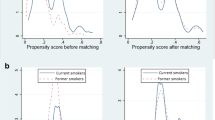Summary.
Objectives: The study examines associations between intentions to quit smoking and health status in three age groups of Hungarian smokers, along with social-demographic background variables.
Methods: In 2002, a cross-sectional representative health survey of the sample of 12 668 adults was conducted in Hungary. The associations between health status and intentions to quit smoking were analysed with logistic regression among current smokers (N = 3 408). The influence of health-related and social predictor variables was tested separately in different age groups (18–34, 35–49, 50–64, >65).
Results: Experiences of chest pain principally motivate young adults to quit smoking. Middle-aged smokers consider quitting because of suffering from cardio-vascular disease. Among the oldest, only respiratory disease influenced quitting attempts. Among social background variables only the fact of living with a spouse had an influence, gender and socio-economic status did not.
Conclusions: Connections between health status and quitting intentions are weakening as age is increasing. The population seems to become gradually conscious of the connections between circulatory problems and smoking. Quitting attempts are restrained by the general attitude that ill health is a normal part of the ageing process.
Zusammenfassung.
Zusammenhänge zwischen ungünstigem Gesundheitsstatus und Versuchen, mit dem Rauchen aufzuhören, in Ungarn
Fragestellung: Die Studie untersucht die Zusammenhänge zwischen der Absicht, mit dem Rauchen aufzuhören, und dem Gesundheitsstatus in Altersgruppen (18–34, 35–49, 50–64, >65) von ungarischen Rauchern, zusammen mit soziodemographischen Drittvariablen.
Methoden: In 2002 wurde eine repräsentative Querschnittstudie bei 12 668 Erwachsenen in Ungarn durchgeführt. Die Zusammenhänge zwischen Gesundheitsstatus und den Versuchen, mit dem Rauchen aufzuhören, wurden mittels logistischer Regression bei aktuellen Rauchern (N = 3 408) analysiert. Der Einfluss von gesundheitsrelevanten und sozialen Prädiktorvariablen wurde separat für die Altersgruppen getestet.
Ergebnisse: Erfahrungen mit Brustschmerzen motiviert junge Erwachsene hauptsächlich, mit dem Rauchen aufzuhören. Erwachsene im mittleren Alter erwägen einen Rauchstopp bei kardio-vaskulären Erkrankungen. Bei den ältesten Erwachsenen sind es nur Atembeschwerden, die Rauchstopp-Versuche beeinflussen. Bei den sozialen Drittvariablen hat nur die Tatsache, mit einem Ehepartner zu leben, einen Einfluss, Gender und sozioökonomischer Status hingegen nicht.
Schlussfolgerungen: Zusammenhänge zwischen Gesundheitsstatus und den Versuchen, mit dem Rauchen aufzuhören, werden mit zunehmenden Alter schwächer. Die Bevölkerung scheint sich der Verbindungen zwischen Kreislaufproblemen und Rauchen allmählich bewusst zu werden. Rauchstopp-Versuche werden durch die allgemeine Haltung eingeschränkt, dass Krankheit ein normaler Teil vom Altersprozess ist.
Résumé.
Association entre l’état de santé et l’intention d’arrêter de fumer : le cas de la Hongrie
Objectifs : Identifier les liens existant entre le désir d’arrêter de fumer et l’état de santé dans quatre groupes d’âge de fumeurs en Hongrie, selon plusieurs variables sociodémographiques.
Méthodes : Une étude transversale a été menée en 2002 auprès d’un échantillon de 12 668 adultes hongrois. Les associations possibles entre l’état de santé et l’intention d’arrêter de fumer ont été analysées au moyen de la régression logistique parmi les actuels fumeurs (N = 3 408). L’influence des variables prédictrices liées à la santé et au statut social a été testée séparément selon le groupe d’âge (18–34, 35–49, 50–64, >65 ans).
Résultats : Le fait de souffrir de douleurs thoraciques pousse principalement les jeunes adultes à cesser de fumer. Les fumeurs d’âge moyen envisagent de cesser de fumer lorsqu’ils souffrent de maladie cardiovasculaire. Pour les plus âgés, seule une maladie respiratoire a un effet sur les tentatives de cesser de fumer. Parmi les variables sociodémographiques, seul le fait de vivre maritalement exerce une influence, mais ni le sexe ni le statut socioéconomique.
Conclusions : L’association entre l’état de santé et l’intention d’arrêter de fumer diminue avec l’âge. La population ne semble prendre que graduellement conscience des liens existant entre les problèmes cardiovasculaires et le tabagisme. Les tentatives d’arrêter de fumer sont limitées par la croyance générale selon laquelle un état de santé précaire fait partie du processus de vieillissement normal.
Similar content being viewed by others

Author information
Authors and Affiliations
Corresponding author
Rights and permissions
About this article
Cite this article
Szanto, Z., Susanszky, E. & Kopp, M. Relationships between unfavourable health status and smoking cessation attempts in Hungary. Soz.-Präventivmed. 50, 324–333 (2005). https://doi.org/10.1007/s00038-005-3148-9
Received:
Accepted:
Published:
Issue Date:
DOI: https://doi.org/10.1007/s00038-005-3148-9



